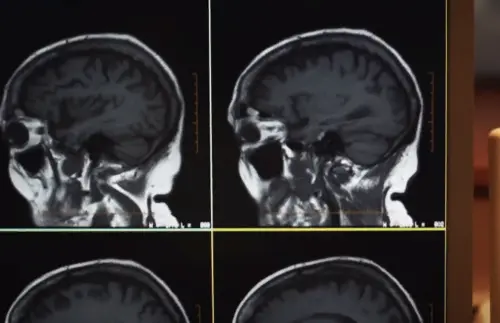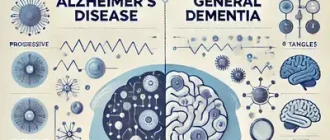Brain diseases are often diagnosed with the use of CT scans and MRIs by healthcare experts. While both approaches provide detailed pictures of the brain, they are distinct in the tools, procedures, and results that they use.
CT Scan (Computed Tomography):
- Technology: A CT scan uses X-rays to create detailed cross-sectional images of the brain.
- Procedure: In a CT scan, the patient reclines on a table that moves into a machine shaped like a doughnut. X-ray beams rotate around the head to produce images.
- Speed: CT scans are fast, usually only taking a few minutes to finish.
- Information: CT scans are very effective at identifying sudden medical conditions such as brain bleeding, fractures, and irregularities in bones.
MRI (Magnetic Resonance Imaging):
- Technology: An MRI machine creates high resolution pictures of the brain by using a combination of magnetic field and radio waves.
- Procedure: Patients getting an MRI scan lay down on a moving table that slides into a spacious, tunnel-shaped device.
- Duration: MRIs take longer than CT scans, usually lasting between 30 to 60 minutes.
- Information: MRIs offer precise imagery of soft tissues such as the brain, nerves, and blood vessels. They are useful in identifying tumors, brain injuries, and neurological disorders.
Comparison Table:
| Category | CT Scan | MRI |
|---|---|---|
| Technology | Uses X-rays | Uses magnetic fields and radio waves |
| Procedure | Quick and less noisy | Longer and noisier |
| Image Clarity | Good for bones and bleeding | Superior for soft tissues and detailed brain anatomy |
| Radiation | Involves radiation exposure | No radiation exposure |
| Typical Uses | Head trauma, skull fractures | Brain tumors, neurological disorders |
What Can a Brain CT Scan Show That an MRI Cannot?
While both magnetic resonance imaging (MRI) and computed tomography (CT) scans of the brain provide precise pictures, the latter is often more suited to revealing specific problems and features.
Bone fractures and severe bleeding are two conditions that CT scans may identify with remarkable sensitivity. Emergency circumstances involving brain bleeding or skull fractures requiring quick care are ideal for CT scans due to their fast imaging capacity.
Calcifications and Bony Structures: CT scans provide superior imaging of calcified structures within the brain and are more adept at visualizing the bony anatomy of the skull compared to MRI. This can be important in the diagnosis of tumors that have calcium deposits, as well as in assessing the extent of damage following trauma.
Cost and Speed: Although these are not direct imaging features, they are practical considerations. CT scans are generally less expensive and faster to perform than MRIs, making them more accessible when quick decision-making is crucial.
However, it is important to note that MRI is superior for soft tissue contrast and can provide more intricate details of the brain’s structure, including better visualization of myelin, the early detection of ischemic stroke, and abnormalities in brain tissue. The choice between CT and MRI often depends on the specific clinical situation and the information needed by the healthcare providers.
Can an MRI and CT Scan Miss a Brain Tumor?
In the context of brain tumors, MRI scans are considered the gold standard due to their high spatial resolution and ability to differentiate between soft tissues. However, certain factors can lead to a brain tumor being missed on an MRI, such as:
- The size of the tumor: Very small lesions may not be detected.
- The location: Tumors in complex areas of the brain might be obscured.
- Specific characteristics: Some tumors may have imaging properties similar to normal brain tissue.
In the case of CT scans, which use X-rays to create detailed images, detection can be even more challenging for reasons including:
- Lower soft tissue contrast: CT is less sensitive for detail in soft tissue compared to MRI.
- Radiation exposure: There’s a limit to the frequency of use, potentially leading to less frequent imaging.
Both modalities require expert interpretation; human error in reading the scans can also result in a tumor being overlooked. Furthermore, administering and timing of contrast material can affect the visibility of a tumor.
However, it is crucial to know that an overwhelming majority of brain tumors are accurately diagnosed using these imaging techniques, especially when combined with a comprehensive assessment of the patient’s clinical symptoms and history. In rare instances, additional diagnostic methods may be employed should MRI or CT scans prove inconclusive.
Cost Comparison
Creating a detailed table of the costs for CT and MRI brain scans across various clinics in the United States would require accessing proprietary pricing information that might not be publicly available or consistent due to frequent changes in healthcare pricing. However, to illustrate how such a table might look based on hypothetical or generally observed data, see the example below:
Please note that actual prices can vary widely based on several factors, including geographic location, whether the clinic is part of a larger hospital system, the specific type of CT or MRI scan required, and the patient’s insurance coverage. Additionally, some clinics offer discounts for cash-paying patients.
| Name of Clinic | Price for CT Brain Scan (USD) | Price for MRI Brain Scan (USD) |
|---|---|---|
| Pacific Medical Imaging Clinic | $500 – $700 | $700 – $2,000 |
| Midwest Diagnostic Center | $400 – $600 | $600 – $1,800 |
| Atlantic Radiology Associates | $450 – $650 | $750 – $2,100 |
| Southern Health Imaging Services | $420 – $680 | $650 – $1,900 |
| City Hospital Radiology | $800 – $1,200 | $1,000 – $2,500 |
| Suburban Imaging Specialists | $350 – $550 | $600 – $1,700 |
| Premier Diagnostic Clinic | $600 – $850 | $800 – $2,200 |
| North Star Imaging Group | $475 – $675 | $750 – $1,950 |
| Grand Valley Imaging Center | $330 – $530 | $630 – $1,630 |
| Coastal Radiology Network | $400 – $620 | $670 – $1,870 |
| MetroHealth Imaging Department | $550 – $750 | $780 – $2,080 |
Summary
Overall, CT scans and MRIs are both important for diagnosing brain issues, but they each have their own strengths. CT scans are quick and effective for identifying sudden injuries, while MRIs offer more in-depth information on soft tissue and are better for assessing long-term conditions. Ultimately, the decision between a CT scan and an MRI depends on the specific medical need and the information needed by the healthcare provider.
About the Author
Reyus Mammadli is the author of this health blog since 2008. With a background in medical and biotechnical devices, he has over 15 years of experience working with medical literature and expert guidelines from WHO, CDC, Mayo Clinic, and others. His goal is to present clear, accurate health information for everyday readers — not as a substitute for medical advice.







